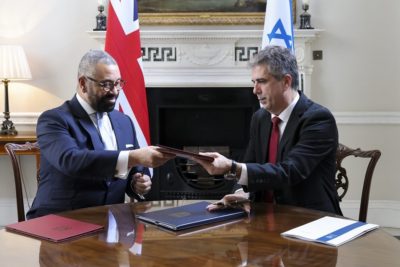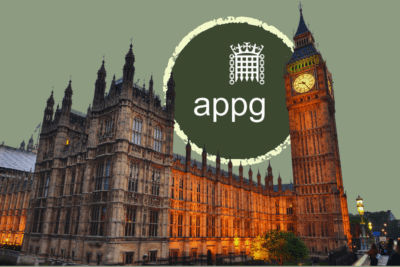Complicit partners? The UK-Israel Roadmap

UK-Israel relations are correctly under intense scrutiny as the assault on Gaza, the equally indiscriminate killing in Lebanon, and opportunistic attacks on Syria continue. So far, the new Labour government seems as committed to maintaining normal relations with Israel as its Conservative predecessor, making only the smallest of concessions to horrified public opinion.
In this context, it is vital to examine the cooperation agreements and partnerships that the UK has signed with Israel. Although developed and signed under the previous government, these agreements provide some of the context and rationale for the UK’s continuing support for Israel’s actions in spite of the overwhelming evidence of international war crimes and genocide against Palestinians, most recently compiled in last week’s report by Amnesty International.
Beyond its announcement a year and a half ago it has received little media or parliamentary attention despite the current political situation, yet its implications for the entwining of UK and Israeli interests, and the politics that go with them, are profound.
The 2030 Roadmap for UK-Israel Bilateral Relations, signed in 2023, brings together both pre-existing and new initiatives under a single ‘strategic partnership’, and provides an ideological framework for it. The Roadmap is the culmination of years of diplomat engagement between Britain, the former colonial power in the region, and Israel, which serves as a key node of US/Western power in the area. Beyond its announcement a year and a half ago it has received little media or parliamentary attention despite the current political situation, yet its implications for the entwining of UK and Israeli interests, and the politics that go with them, are profound.
The Roadmap narrates a ‘vision’ of ‘freedom-loving, innovative and thriving democracies’ yet ironically there is a strong sense of democratic deficit in at least two regards. First, the agreements and initiatives, and the process of their development, are generally opaque and sometimes classified. The Roadmap itself is in the public domain but the details are thin.
The nature of UK-Israel relations not only bears strongly on concerns about militarism and the foreign policy that supports it, but also on a democratic deficit in relation to how strategic and shorter term policy decisions are made.
Secondly, successive UK governments have been vocally and materially supportive of Israel even as its ethnonationalist nature has become clear to populations at home, who poll as pro-ceasefire in substantial majorities. There is also concern for community relations in the UK and ‘only a minority think the UK Government has got the balance right in its response’. Whatever the government’s unyielding line is, it is not democratic. We’re concerned that the nature of UK-Israel relations not only bears strongly on concerns about militarism and the foreign policy that supports it, but also on a democratic deficit in relation to how strategic and shorter term policy decisions are made.
What we know of these agreements reveals a wide range of material and ideological commitments on economics, technology development and defence, as well as other areas. Here we look at some of the elements of the Roadmap that have particular implications for human rights, peace and security – in the Middle East but also globally and at home.
From classified agreement to strategic partnership
In late 2020 it was reported that the UK and Israeli chiefs of defence staff had signed a joint agreement to ‘formalise and enhance’ military cooperation. The agreement was described as ‘highly classified’ but said to include ‘defence medical training, organisational design concepts and defence education’.
In 2021, Alba Party MP Kenny MacAskill asked then-defence minister James Heappey in a parliamentary question if he would publish the agreement. Heappey replied that the agreement ‘streamlined’ and ‘formalised’ the relationship, but maintained:
‘While this agreement is an important piece of defence diplomacy, the security implications of this work warrant the agreement being kept at a higher security classification, and therefore it will not be made public.’
Elements of defence cooperation appear to be particularly secretive. In October, Declassified UK reported on a UK-Israel project to harden the state against attacks by Iran and Hezbollah, based on leaked slides of an initiative named Project HEZUK formulated in 2019-20. The report lists a number of ways in which the two militaries will cooperate, including the development of new weapons such as hypersonic missiles. It also suggests how this kind of cooperation creates strong political constraints:
‘The UK’s growing reliance on Israel’s arms industry has created fears that an arms embargo on Tel Aviv could trigger reciprocal measures, hampering Britain’s own military capabilities.’
In March 2023, Israel and UK signed the more public 2030 Roadmap for UK-Israel Bilateral Relations. A Memorandum of Understanding had first been signed in November 2021 ‘elevating the UK-Israel bilateral relationship to a strategic partnership’. The MoU ‘represented a signal of intent for both countries to cohere, deepen and expand cooperation across our mutual priorities for our mutual benefit’; this cooperation was made concrete by the Roadmap.
The Roadmap document references another agreement, the Abraham Accords, which were brokered by Trump’s administration in 2020 to normalise relations between Israel and a number of Arab states in the region. The Roadmap speaks of the potential of the Accords ‘to enable profound advancements for security, co-existence, prosperity and peace for the region and its peoples’. However, Palestinian politicians condemned the Abraham Accords for undercutting the understanding that relations between Israel and Arab nations would only be normalised with a two-state solution for Palestine and an end to occupation. This fear was well founded, and around the time of signing the Roadmap in 2023 even the US and UK governments were openly expressing concern about Israel’s annexation of Palestinian land, which threatens the possibility of a two-state solution.
The UK government’s announcement of the signing of the Roadmap by the then-Foreign Secretary James Cleverly, describes the agreement as ‘a testament to the strength of our close and historic relationship’. He continued:
‘The UK and Israel are committed to a modern, innovative and forward-looking relationship that continues to focus on mutual priorities for mutual benefit. The 2030 Roadmap for Israel-UK Bilateral Relations is an ambitious agreement that will ensure the partnership remains modern and continues to innovate to address shared challenges.’
Iran was named as one such ‘shared challenge’ as was the continuing need for Israeli support in countering Russia’s offensive in Ukraine.
Adopting a thematic approach, the Roadmap contains detailed commitments for deepening cooperation across the breadth of the UK-Israel relationship, including on trade, cyber, science and tech, research and development, security, health, climate and gender equality.
Defence and security and the crossover with cyber and technology
The Roadmap states how important the UK’s defence relationship with Israel is considered to be:
‘For both the UK and Israel, this is one of the most important defence and security relationships, encompassing a broad range of activities.’
The document itemises, but gives almost no detail, on four areas of this defence relationship: bilateral defence cooperation including strategic dialogue and professional working groups, the military cooperative agreement signed in 2020 (mentioned above), joint training and exercises; force build-up, research and development ‘to identify transformational defence and security capabilities’; counter-terrorism (CT) dialogue and cooperation to ‘ensure a coordinated approach to CT issues that impact both countries’ national security; and, working ‘closely to counter the current threat from Iran’.
Other key planks of the Roadmap – particularly cyber and technology – also have huge implications for the defence and security relationship between the UK and Israel. The Roadmap states that ‘the UK recently elevat[ed] Israel to a “tier 1” cyber partner’. This cooperation is mostly presented as ‘promot[ing] international security and stability in cyberspace’, but there is also a commitment to ‘prioritising increased links between Israeli start-ups and the UK ecosystem’. The Foreign Office claimed this relationship has already delivered ‘huge benefits’:
‘Our trade relationship is worth around £7 billion, and there are more than 400 Israeli tech firms operating in the UK.’
The Roadmap announced a ‘tech gateway’ project ‘to increase the number of high-growth Israeli tech firms setting up substantial operations in the UK’. This is run by the UK-Israel Tech Hub which was established in 2011 and operates from the British Embassy in Israel. Referencing a ‘pan-Northern UK-Israel health-tech gateway’ which encourages Israeli start-ups in the NHS, a number of UK regions are named as areas of opportunity, such as the tech and cyber-based Golden Valley development in Gloucestershire which will sit alongside GCHQ. The Roadmap also announced a framework for UK-Israel cooperation in science, technology, research and innovation which was signed as a Memorandum of Understanding in September 2023, as well as schemes to promote industrial R&D, business and academic collaborations.
We don’t know how many of these firms have defence and security work, but, given the growing importance of ‘tech’ to the military, and the blurring of boundaries between civil and military uses, it is likely to be some. Via the Campaign Against Arms Trade (CAAT) we do know that there are a number of firms who have arms export licenses to Israel operating in the UK, including a large number who are involved in the F35 fighter jet production or supply chain, and the Israeli arms company Elbit Systems. Elbit’s various subsidiaries and joint ventures in the UK has been repeatedly targeted by determined anti-arms trade protestors. In November, its joint venture with the defence company Thales lost a UK military contract for the Watchkeeper drone which, as Drone Wars reported, has a history of failing to live up to the military tech innovation narrative.
Regarding the flow of Israeli arms into the UK, CAAT state that, ‘The UK spends millions of pounds each year on “battle-tested” arms from Israeli companies.’ A database compiled by the Israeli anti-militarist organisation New Profile provides an extensive list of UK-Israel military relations and exports of military equipment to the UK. A 2023 report by Al Jazeera explores how ‘a range of weapons and surveillance tech has been deployed against the Palestinians which is then marketed and sold to huge amounts of nations around the world’. Israel also imposes fewer restrictions on arms sales to countries with poor human rights records.
Israel is also a leading developer and trader in surveillance equipment. The Pegasus software from the Israeli company NSO Group has gained notoriety with multiple claims that it has been used by numerous repressive regimes and Israel itself to spy on political activists, journalists and lawyers. Our colleagues at Medact are campaigning on the involvement of the US tech corporation Palantir in the NHS, as an issue of Palestine solidarity but also because of fears about how the company will use all of our health data. Palantir has a history of CIA links and works across various industries, including defence and security. It describes its military technologies as ‘mission-tested capabilities, forged in the field’. It is implicated in spying activities in warzones like Afghanistan and Gaza and against domestic populations around the world.
Antisemitism and ‘anti-Israel bias’
The Roadmap makes clear the UK commitment to fighting antisemitism and challenging Holocaust denial and distortion. On the face of it, this is laudable, but in the detail, the UK-Israeli treatment of the issue is more problematic. The Israeli state and its spokespeople are committed to conflating criticism of Israeli policy with anti-Jewish racism. This is a core part of so-called ‘hasbara’, or Israeli state propaganda.
The Roadmap also conflates issues which do not easily sit together. Antisemitism, ‘delegitimisation’ – presumably of Israeli state policy – and ‘anti-Israel bias’ are strung together without proper explanation. One section pledges a National Holocaust Memorial in the UK – an important educational initiative – but the next laments the fact that Israel and its policies are subject to so much scrutiny. There is also objection about the use of the term ‘apartheid’ – endorsed by various expert bodies like Amnesty and Human Rights Watch – to describe Israel’s policies towards Palestinians.
The Roadmap states that it will ‘tackle’:
‘…the disproportionate focus on Israel in the UN and other international bodies, including attempts to delegitimise it or deny its right to self-defence. All states have a duty to comply with their obligations under international law, but scrutiny must be measured, impartial and proportionate.’
The International Court of Justice, whose subsequent genocide case has caused so much ire for western and Israeli leaders alike, is singled out for criticism.
The debate around what is anti-Zionism and what is antisemitism will doubtless continue. The Roadmap states that the UK would ‘continue to encourage’ the adoption of the International Holocaust Remembrance Alliance (IHRA) controversial definition of Holocaust denial and distortion. The UK has held the position as chair of the IHRA in 2024 and Israel will hold it for 2025.
It’s worth revisiting Jewish scholar Noam Chomsky’s intervention from 2002 in light of the Roadmap’s criticisms and statements.
‘With regard to anti-Semitism, the distinguished Israeli statesman Abba Eban pointed out the main task of Israeli propaganda…is to make it clear to the world there’s no difference between anti-Semitism and anti-Zionism. By anti-Zionism he meant criticisms of the current policies of the State of Israel.’
He went on to say:
‘To turn to what are called the problems of Israel / Palestine, that’s a misnomer. It should be called the problems of US-Israel versus Palestine. Britain is also involved in its usual manner…Britain doesn’t play an initiating, active role in the conflict but a passive role essentially supporting the US.’
Free market ideology
The Roadmap makes the signatories’ commitment to a free market economic model abundantly clear. Existing and new trade agreements between the two countries – lowering barriers and championing free trade – are lauded and the document is stuffed with excited rhetoric – science and technology will be ‘supercharged’ to create ‘future technologies’ for ‘mutual benefit’. Israel is a ‘start-up nation’, with an ‘international reputation for technological innovation’, which the UK government will no doubt be looking towards with its technical fix approach to the climate crisis.
The introductory section on the partnership conflates a commitment to democracy with innovation and creation, presumably in the neo-liberal mould of private capital and industry:
‘Israel and the UK are united in the common belief that a democracy – which empowers citizens with the opportunity to innovate, create, and fulfil their dreams – is the finest form of government.’
Creating jobs and growth provides another strong narrative: ‘Our nations can do so much more together to create jobs and fuel economic growth through priority areas of cooperation’. With its announcement, the Foreign Office stated that ‘Israeli investment into the UK drives growth and jobs, adding around £1 billion gross value to the UK economy and creating about 16,000 jobs in the last 8 years’. This economic benefit is perhaps not a lot when considering the political effort put in to the Roadmap, although justifying policy decisions in terms of jobs and growth – however much other factors should take precedence – will be music to the ears of the Labour leadership.
The signatories lean on the usual set of legal and human rights buzzwords, which now seem particularly incongruous and meaningless:
‘We are clear that democratic norms are the mainstay for maintaining a rules-based international system and respect for universal human rights.’
And the description of the UK and Israel as ‘outward looking patriotic nations’ conceals, but perhaps also hints at, what is in practice a form of ethnic supremacism backed by a highly militarised state apparatus.
What is the impact of the ‘strategic partnership’?
Given the strategic nature of the Roadmap, and the heightened political awareness of the moment, the little debate that parliamentarians who question the partnership have managed to garner has received no attention in corporate media. A handful of MPs responded to its announcement with deep concern, noting the it did nothing to deter illegal settlements in Israel and threatens the two-state solution. As Andy Slaughter noted, ‘Far from raising concerns about the abuse of Palestinian human rights and breaches of international law, it attacks UN bodies for raising those very concerns.’ Marsha de Cordova’s query about an ‘assessment of the road map’s compatibility with international law and UN Security Council resolution 2334’ does not seems to have been answered.
An official statement about the signing of the Roadmap by Husam Zomlot, the Palestinian Ambassador to the UK spoke of ‘utmost dismay’:
‘This leaves the Palestinian side with no recourse to international bodies. It leaves Israel free to pursue policies that have brought us to where we are: No end in sight to occupation, no accountability for Israel under international law and no progress toward a two-state outcome.’
‘Why are we in a military pact with military forces that carry out such actions?’
In May 2024 Kenny MacAskill again asked a question in parliament on the military co-operation agreement – this time to suggest that it be reviewed in light of allegations that white phosphorus had been used in Gaza. He referred to a doctor who had detailed the horrors of white phosphorus munitions and asked:
‘Why are we in a military pact with military forces that carry out such actions? If the Minister will not repudiate the pact entirely, will he ensure that the use of white phosphorus munitions in our name is not acceptable?’
The then-defence minister Leo Docherty said the UK had not supplied any white phosphorus and insisted that the UK’s status as an ally would protect civilians, putting unrealistic onus on Hamas:
‘We should focus on our confidence that Israel is an important ally, which means that we can make the point that the protection of civilians is of the utmost importance. We should also remember that at the heart of this conflict is the fact that if peace is to be achieved, Hamas need to lay down their arms and release the hostages.’
During another parliamentary debate on the same day in May, Docherty responded to a question from the independent MP Andrew Bridgen about Israeli conduct in Gaza and ‘the problem of unconditional UK military support’. He stated that ‘nothing is unconditional’ but further insisted that ‘supporting our ally…is the honourable thing to do’. He went on to say that ‘we use our military capability to ensure that humanitarian aid can flow into Gaza as quickly as possible’.
Challenged on the ICC’s ruling on genocide, Docherty said it had ‘no bearing’: ‘We will make our judgments about the legality of our actions on our own terms, and we are confident in that legality.’
The Roadmap spells out why, as an ‘important ally’, the support of the UK for Israel’s strategy in Palestine, if not all its individual actions, is pretty much ‘unconditional’.
These exchanges illustrate the profound commitment that the UK has to Israel, articulated and strengthened with the Roadmap, which takes precedence over willingness to be an effective critic. The Roadmap itself is beyond debate and spells out why, as an ‘important ally’, the support of the UK for Israel’s strategy in Palestine, if not all its individual actions, is pretty much ‘unconditional’. Once the partnership was in the bag, any criticism will hardly be taken seriously, and can be dismissed, as the token reproaches from the new government have demonstrated.
The Roadmap shores up the position of the UK as an ideological bedfellow for Israel, as well as a practical ally. As gestures of political support alongside the recognition of shared interests, the military, tech and trade agreements of the last few years strengthen the hand of Israel. It’s not as if the human rights violations and desperate material conditions were not already highly visible.
However, the UK landscape for the ‘strategic partnership’ has shifted considerably since mid 2023. Even before the widespread horrors and illegality of the last year, and just months after the Roadmap was published, the Foreign Secretary again met with his Israeli counterpart for talks and ‘urged’ the Israeli government to ‘stop settlement expansion and act to prevent settler violence and the culture of impunity’. They also spoke about another issue that could threaten the wisdom of the partnership: the ‘departure from the democratic values that underpin our strategic partnership’ with the Israeli government’s embrace of extreme right wing political groups and the large-scale public protest against constitutional changes during the summer of 2023.
Suspend the Roadmap
The Roadmap is couched in liberal language about partnerships, exchange, and innovation in a framework of democracy and shared values. It would be reasonable to assume that the UK could wield influence with the kind of partner who would sign up to this shared vision. The Roadmap’s very public statement about the UK’s profound commitment to Israel perhaps then presents an opportunity to make an equally public gesture in defence of these values.
A defence analyst on the RUSI website – an establishment security think-tank – recently discussed how the new UK government’s bid to maintain a ‘balanced position’ on the situation in Gaza is impacting the perception elsewhere of its commitment to the ‘rules based order’. Amongst other recommendations for how the UK government could more effectively impact the situation, the analyst concluded that the Roadmap provides a powerful tool for leverage:
‘Given the ongoing widespread concerns around violations of international humanitarian law, London should furthermore consider re-evaluating the 2030 roadmap agreement that was signed with Israel in 2023. That agreement has significant impact on bilateral relations on military support and trade, among a wide variety of other fields.’
Referencing the UK’s own self interest in the longer term, he concludes:
‘Given that Israel is currently in the dock at the ICJ for genocide charges, a suspension of the agreement until the outcome of the case at least, would seem prudent.’
This echoed an open letter signed in April by an astounding 1,100 lawyers and legal academics in the UK calling for the suspension of the Roadmap as one of five actions the government must take given its obligations under international law. The letter outlined a legal mechanism whereby the UK could use its position of being ‘Israel’s second largest trading partner’ to wield influence. Without pausing the Roadmap the Government do not ’employ all means reasonably available’ to them, as demanded by the 1948 UN Genocide convention.
See more: human rights, military in society, security, UK Parliament, defence & foreign policy, democracy
Like what you read?
> Sign up for our newsletter or blog notifications
> Support our work – from just £2 a month










